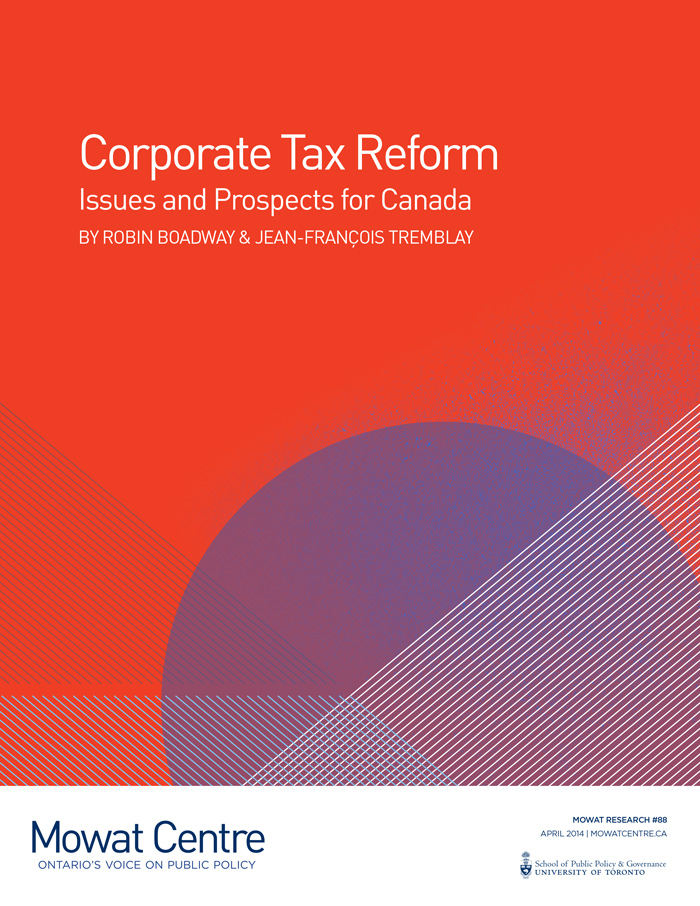May 12, 2014
Issues and Prospects for Canada
Canada’s corporate tax framework is in clear need of reform. This paper proposes a rent-based system of corporate tax which would better align with the realities of a 21st century globalized economy.
Executive Summary
When the foundational elements of Canada’s corporate tax were put in place, they addressed the needs and policy concerns of a very different national and global context. More than four decades on, a seismic shift has taken place that has fundamentally altered our social and economic circumstances: the economic integration resulting from globalization has led to greater capital and corporate mobility, increased competition on tax rates, and substantial restructuring of Canada’s economic base away from manufacturing and toward services and resources. Higher rates of education and specialization, as well as women’s increased economic participation, have transformed our labour markets. The economic transformation has also been marked by increases in precarious employment and income inequality.
These dramatic shifts have brought the need for substantive corporate tax reform clearly into view. While there have been significant efforts to modernize Canada’s sales tax and personal income tax, there has yet to be a serious public debate about the role and design of a corporate tax system that better meets the needs of modern Canada. In fact, the system has remained largely unchanged throughout the post-war period.
Beyond serving as a significant source of public revenues, a modern corporate tax system should help federal and provincial governments achieve public policy goals of economic growth, increasing investment, and improving productivity and international competitiveness. An effective corporate tax should also raise revenues in a way that is efficient, transparent and equitable while discouraging avoidance.
Canada’s current corporate tax system is failing on a number of fronts. It discourages investment, hampering innovation and productivity, by taxing the normal return to capital. It increases the risk of bankruptcy by treating debt financing more favourably than equity financing, which encourages firms to rely too heavily on debt finance. The system is economically inefficient and does not properly incentivize the right kinds of corporate behavior.
Continue Reading
Changes in the personal income tax have also served to accelerate the need for corporate tax reform. Originally an extension of the personal income tax, the corporate tax was designed to prevent individuals from avoiding taxes by keeping income in a corporation. However, substantial changes to the personal income tax in recent years have made tax shelters widely available to Canadians through RRPs, RRSPs, TFSAs, and RESPs. Therefore, the intended role of the corporate tax as a way to prevent the reinvestment of corporate profits tax free has largely been negated.
A number of other countries have already taken a hard look at their approaches to corporate tax and many have begun the process of reform. Reviews in the UK, the United States, and Australia have all recommended moving to a rent-based system of corporate tax, and some jurisdictions have implemented reforms on this basis.
A rent-based corporate tax focuses on extraordinary, or ‘above-normal,’ profits, rather than corporate income. Above-normal profits can arise from windfalls due to price-setting advantages (e.g. from a monopolistic position), unexpected price-changes, returns on intellectual property or locational advantages, natural resources or prime agricultural land. By taxing extraordinary profits, instead of corporate income, a rent-based corporate tax can remove barriers to investment that exist in the current system. For example, a marginally-profitable project becomes unprofitable after income tax is applied. Therefore, the current tax system can have the perverse effect of discouraging corporate investment. A rent-based tax would also remove the incentive for corporations to rely more heavily on debt financing than equity financing.
To put it simply, the attraction of taxing rents is that, unlike the current system of taxing income, no economic inefficiency would result. In most cases, a tax on rents does not create a disincentive to investment, unlike a tax on normal profits.
The paper contains several recommendations to modernize Canada’s corporate tax: the starting place for transition to a rent-based tax is the adoption of an allowance on corporate equity that would add a deduction for the cost of equity finance; this would be followed by changing the personal income tax by eliminating the dividend tax credit and including 100 per cent of capital gains in taxable income. Important additional reforms outlined in the paper would further strengthen the efficiency and fairness of Canada’s corporate tax.
Moving the corporate tax from its current form to a rent-based tax could, on balance, increase the fairness of the tax system because existing allowances for dividends and capital gains would be eliminated—allowances that disproportionately benefit higher-income earners. Also, due to the highly integrated nature of today’s international capital markets, corporate tax is largely shifted away from shareholders and on to workers. Because the focus of taxation would be on above-normal profit rather than corporate income, the current tendency for firms to pass along the cost of income tax to workers in the form of lower wages would be curtailed in the long run.
Canada’s corporate tax system needs reform. This paper outlines a practical path to a new system that would align with the realities of a 21st century globalized economy.
Authors
Robin Boadway
Jean-François Tremblay
Release Date
May 7, 2014
ISBN
978-1-927350-74-4
Mowat Research
No. 88








